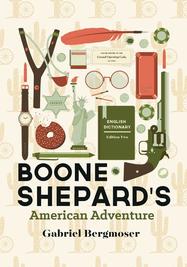 Earlier today I did my periodic check on Goodreads to see if there were any new reviews or ratings for Boone Shepard. This isn’t something I do often; most responses happened back around the time the book came out and new ratings are only occasional. Besides, I’m well past the point of being hellbent on seeing reviews; in the two years since Boone Shepard came out I’ve heard everything from people calling it their favourite book to people saying it outright sucked and many, many more responses somewhere in between those two polar extremes. Today there was one new rating for each book; five stars for Boone Shepard and three stars for Boone Shepard’s American Adventure, from the same reviewer. I didn’t take offense to this; rather it just struck me as further evidence of this weird divide I’m noticing in how I think about the books and how people react. It’s something that is especially obvious with kids, who aren’t so good at hiding their feelings; Boone Shepard gets a lot of love while American Adventure seems to have been treated as an inferior, forgettable follow up. It’s interesting because I think American Adventure is a far stronger book. While I remain proud of Boone Shepard and wouldn’t change anything about it, I do think it was constrained by the pressure of being the debut release of a new publishing house along with my first novel. It was re-edited and reappraised so many times that when I look over it now I almost feel like it lost a bit of the loose, eccentric fun that I associate with the character. This probably wasn’t and isn’t the worst thing in the world; Boone Shepard had to establish the brand but do it within a plot that was originally designed to be the darker second book, so maybe there was an issue in that it started the series on a slightly more serious note than I had envisioned the default as being. American Adventure, to me, was a chance to let my hair down a bit and write the kind of rollicking, silly adventure yarn that I had originally wanted the series to be comprised of. Knowing at the time that books three and four (which have been reworked now as one final volume) would only get darker, I decided to try and make American Adventure feel more like one of the Boone Shepard short stories; silly, action packed, implausible but with a persistent melancholic thread beneath it. The result, I suspect, suffers in comparison to the first book. For all its quirky characters and literary references, the original Boone Shepard is still a story about murder, human experimentation, rising up against oppression and confronting your past. The stakes are pretty damn high and I remember people commenting to me after the release that, for a children’s book, it was very dark. American Adventure, by contrast, probably feels more like a lightweight confection. Technically the stakes are higher (the villain is literally trying to take over the world) but they’re less personal and the characters don’t treat their situation with the same gravity they did in the first book. This was a conscious choice and I feel like I hit the mark, but I can understand why it would feel like a step down rather than an escalation. Freed of the pressure of starting a series and a career, I had a lot more fun with American Adventure, which is probably why I like it more than the first book even if it’s less emotionally engaging. I can speculate on why it doesn’t get the same appreciation (for all I know it could just outright suck), but ultimately it comes down to a fact that every writer has to try and remember; for better or worse, your audience doesn’t see your work the same way as you do. It’s like your perspective is of someone looking at a tree with X-Ray vision; you can see the insects moving around inside it, the sap, the roots below and the soil feeding them. You have a clearer understanding of what has gone into it, but you can’t see how the thing looks to someone without that same X-Ray vision. You can guess and if you’re good enough at what you do the guess can be spot on, but it will never be 100% reflective of what an objective perspective might see. No writer sets out to make something bad. I think the books, films etc that really work are the ones where the writers were best able to identify how the story would come across to an external party; something that comes with experience. And look, I think you’re doomed to fail if you try too hard to give an audience what you think they want, especially if that audience doesn’t exist yet. Writing is a tricky balancing act in which you need to create something that both comes from a real place but is geared towards readers or viewers who have no reason to care about the personal demons you’re trying to exorcise. Swing too far in either direction, and what you create becomes either self-indulgent or soulless. In the end you can’t know how something is going to be received, even with the most well educated guesswork. Being close to something means missing the obvious. Feedback from trusted people can help to a degree; feedback from objective outsiders can help a lot, but all you can really do is follow your instincts and try your best. And for the record, I still prefer American Adventure to Boone Shepard.
0 Comments
Leave a Reply. |
BLOG
Writing words about writing words. Archives
May 2024
Categories |
 RSS Feed
RSS Feed
